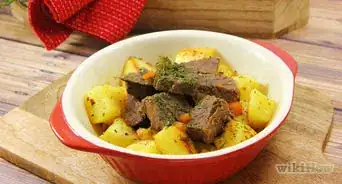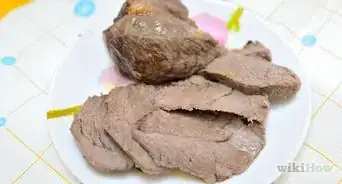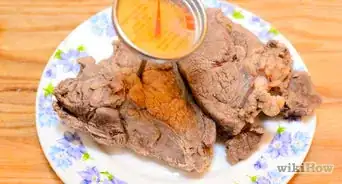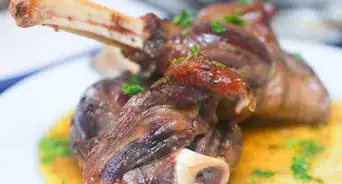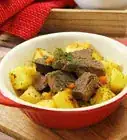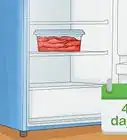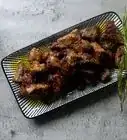This article was co-authored by Marrow Private Chefs and by wikiHow staff writer, Jessica Gibson. Marrow Private Chefs are based in Santa Rosa Beach, Florida. It is a chefs’ collaborative comprised of an ever-growing number of chefs and culinary professionals. Though regionally influenced primarily by coastal, traditional southern, cajun, and creole styles and flavors, the chefs at Marrow have a solid background in all types of cuisine with over 75 years of combined cooking experience.
wikiHow marks an article as reader-approved once it receives enough positive feedback. In this case, several readers have written to tell us that this article was helpful to them, earning it our reader-approved status.
This article has been viewed 465,958 times.
Few things are as comforting and filling as homemade beef stew. Sear chunks of beef chuck roast until they're browned and then sauté onions with celery and garlic. Deglaze the pot with red wine and stir in chicken stock with herbs. Cover and let the beef stew simmer until the beef is tender. Enjoy the beef stew with crusty bread.
Ingredients
- 3 to 4 pounds (1.3 to1.8 kg) beef chuck roast
- 1 to 3 tablespoons (15 to 45 ml) vegetable oil, divided
- 2 medium onions, diced
- 3 celery stalks, diced
- 2 cloves garlic, minced
- 2 tablespoons (32.5 g) tomato paste
- 2 tablespoons (30 ml) Worcestershire, divided
- 1 teaspoon (5.5 g) salt
- 3 tablespoons (23 g) all-purpose flour
- 1 cup (240 ml) red wine or amber beer
- 3 sprigs fresh thyme or 2 teaspoons (1.5 g) dried thyme
- 1 bay leaf
- 4 cups (950 ml) chicken stock
- 3 carrots, diced
- 1 1⁄2 pounds (680 g) potatoes, cubed
- 1 cup (150 g) frozen peas
Makes 6 to 8 servings
Steps
Sautéing the Beef and Vegetables
-
1Trim the beef to bite sized pieces. Get out a 3 to 4 pound (1.3 to1.8 kg) beef chuck roast and use a sharp knife to cut off visible fat. Cut the trimmed roast into cubes that are about 1 in (2.5 cm) in size.[1]
- Ensure the cubes are the same size so the beef cooks evenly.
-
2Sear half of the beef cubes over medium-high heat for 4 to 5 minutes. Pour 1 tablespoon (15 ml) of the vegetable oil into a large pot or Dutch oven. Heat the oil over meidum-high so it begins to shimmer. Then add half of the beef cubes so they're in a single layer. Sprinkle the meat with several pinches of salt and pepper.[2]
- Avoid stirring the beef cubes while they sear or they won't develop a crust.
Advertisement -
3Stir and sear the cubes for 4 to 5 more minutes. Use a spatula or spoon to stir the beef. Try to turn the pieces over so another side of the cubes sear. Stir the beef cubes once more while they cook so most of the beef cubes develop a brown crust. Put the seared meat on a platter and set it aside while you sear the remaining beef cubes.[3]
- Set all of the beef cubes aside on a plate once you've finished searing both batches.
- If the cubes stick to the bottom of the pot, you can add another 1 to 2 tablespoons (15 to 30 ml) of vegetable oil.
-
4Sauté the onions and celery for 8 to 10 minutes over medium heat. Dice 2 onions and 3 stalks of celery before you place them in the hot skillet. Stir and cook the vegetables until the onions become soft and translucent.[4]
- It's important to stir the vegetables frequently so they don't stick to the bottom of the pan.
-
5Stir in the garlic and cook it for 30 seconds. Mince 2 cloves of garlic and stir it into the sautéed onions and celery. Stir and cook the garlic just until it becomes fragrant.[5]
- Avoid cooking the garlic for more than 30 seconds because it can burn easily.
Assembling the Stew
-
1Add the tomato paste, salt, and half of the Worcestershire sauce. Stir in 2 tablespoons (32.5 g) of tomato paste, 1 teaspoon (5.5 g) of salt, and 1 tablespoon (15 ml) of the Worcestershire sauce.[6]
- The vegetables should be coated with the tomato paste.
-
2Coat the sautéed vegetables with flour. Sprinkle 3 tablespoons (23 g) of all-purpose flour over the vegetables in the pot. Use a spoon to stir the mixture until the vegetables absorb the flour.[7]
- The flour will make the vegetables look mushy or soft.
- Coating the vegetables with flour will thicken the stew as it simmers.
-
3Pour the wine or beer into the pot and scrape the bottom of the pot. To deglaze the pot and build flavor, pour 1 cup (240 ml) of red wine or amber beer into it. Turn the burner to medium-high so the liquid begins to bubble vigorously.[8]
- Stir the bottom of the pot thoroughly so the sticky bits are combined with the liquid.
-
4Return the beef to the pot along with the stock, bay, and thyme. Put the browned cubes of beef back into the pot and pour in any juices that accumulated. Stir in 4 cups (950 ml) of chicken stock, 1 bay leaf and 3 sprigs of fresh thyme or 2 teaspoons (1.5 g) of dried thyme.[9]
- Stir so the sautéed vegetables are combined with the broth and seasonings.
- If you don't have chicken stock, substitute beef broth, vegetable stock, or water.
Simmering the Stew
-
1Cover and simmer the stew for 1 1/2 hours. Keep the burner at medium-high heat until the liquid comes starts to bubble. Then turn the burner down to low so it simmers. Put the lid on the pot and keep the stew at a gentle simmer. The longer you simmer the more tender the beef will become.[10]
- Stir the stew occasionally to prevent it from sticking to the bottom of the pot.
- If you prefer, put the covered pot of stew in a 300 °F (149 °C) oven and cook it for 1 1/2 hours.
-
2Add the potatoes and carrots. Dice 3 carrots and cut 1 1⁄2 pounds (680 g) of potatoes into 1 in (2.5 cm) cubes. Stir them into the stew and put the lid back on the pot.[11]
- You can use your favorite type of potato such as Russet, Yukon Gold, or Red Bliss.
-
3Cover and cook the stew for 45 to 60 more minutes over low heat. Stir the stew occasionally as it simmers. The meat should become completely tender and the potatoes should be soft.[12]
- If the meat isn't tender, simmer the stew for 15 more minutes and check it again.
-
4Stir in the peas and remaining Worcestershire sauce. Turn off the burner and stir in 1 cup (150 g) of frozen peas. Add the remaining 1 tablespoon (15 ml) of Worcestershire sauce and remove the bay leaf. Taste the stew and add salt and pepper according to your taste.[13]
- Store refrigerated stew in an airtight container for up to 1 week or freeze it for up to 3 months.
Community Q&A
-
QuestionWhat can I use to thicken my gravy?
 Community AnswerAll you need to do is take the lid off the pot you are using, and let the water evaporate until you are happy with the thickness of the gravy. Alternately, you may use a roux.
Community AnswerAll you need to do is take the lid off the pot you are using, and let the water evaporate until you are happy with the thickness of the gravy. Alternately, you may use a roux. -
QuestionCan I cook chicken stew?
 Community AnswerYes you can. Do not overcook it though, or the chicken will become chewy and hard to eat!
Community AnswerYes you can. Do not overcook it though, or the chicken will become chewy and hard to eat! -
QuestionHow many cubes of beef are needed to make it thick?
 Community AnswerShake stew meat chunks in a large ziplock bag containing flour, garlic powder and seasoned salt. Remove the meat and brown it in olive oil on medium-high heat. The browned flour will provide the binder necessary to thicken the liquid.
Community AnswerShake stew meat chunks in a large ziplock bag containing flour, garlic powder and seasoned salt. Remove the meat and brown it in olive oil on medium-high heat. The browned flour will provide the binder necessary to thicken the liquid.
Things You'll Need
- Measuring cups and spoons
- Knife and cutting board
- Large pot with lid or Dutch oven
- Spoon
- Vegetable peeler
- Platter
References
- ↑ https://www.thekitchn.com/how-to-make-a-very-good-beef-stew-cooking-lessons-from-the-kitchn-184050
- ↑ https://www.thekitchn.com/how-to-make-a-very-good-beef-stew-cooking-lessons-from-the-kitchn-184050
- ↑ https://www.thekitchn.com/how-to-make-a-very-good-beef-stew-cooking-lessons-from-the-kitchn-184050
- ↑ https://www.thekitchn.com/how-to-make-a-very-good-beef-stew-cooking-lessons-from-the-kitchn-184050
- ↑ https://www.thekitchn.com/how-to-make-a-very-good-beef-stew-cooking-lessons-from-the-kitchn-184050
- ↑ https://www.thekitchn.com/how-to-make-a-very-good-beef-stew-cooking-lessons-from-the-kitchn-184050
- ↑ https://www.thekitchn.com/how-to-make-a-very-good-beef-stew-cooking-lessons-from-the-kitchn-184050
- ↑ https://www.thekitchn.com/how-to-make-a-very-good-beef-stew-cooking-lessons-from-the-kitchn-184050
- ↑ https://www.thekitchn.com/how-to-make-a-very-good-beef-stew-cooking-lessons-from-the-kitchn-184050
- ↑ https://www.thekitchn.com/how-to-make-a-very-good-beef-stew-cooking-lessons-from-the-kitchn-184050
- ↑ https://www.thekitchn.com/how-to-make-a-very-good-beef-stew-cooking-lessons-from-the-kitchn-184050
- ↑ https://www.thekitchn.com/how-to-make-a-very-good-beef-stew-cooking-lessons-from-the-kitchn-184050
- ↑ https://www.thekitchn.com/how-to-make-a-very-good-beef-stew-cooking-lessons-from-the-kitchn-184050
About This Article
To make beef stew, start by cutting some beef into bite-sized cubes. Then, sear the beef cubes over medium-high heat for 8-10 minutes. In a separate pot, saute chopped onions and celery for 10 minutes, adding minced garlic in for the last 30 seconds. When the vegetables are done, add tomato paste, salt, Worcestershire sauce, flour, and wine or beer to the pot, as well as the seared beef. Finally, cover and simmer the stew for around 2 and a half hours, adding in chopped potatoes and carrots halfway through. To learn how to sear beef, scroll down!
